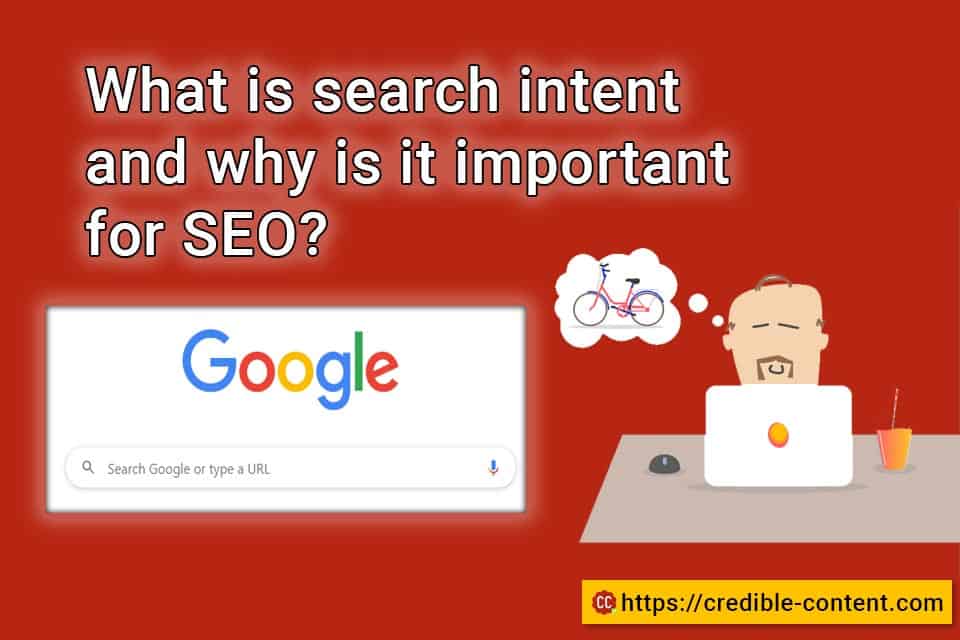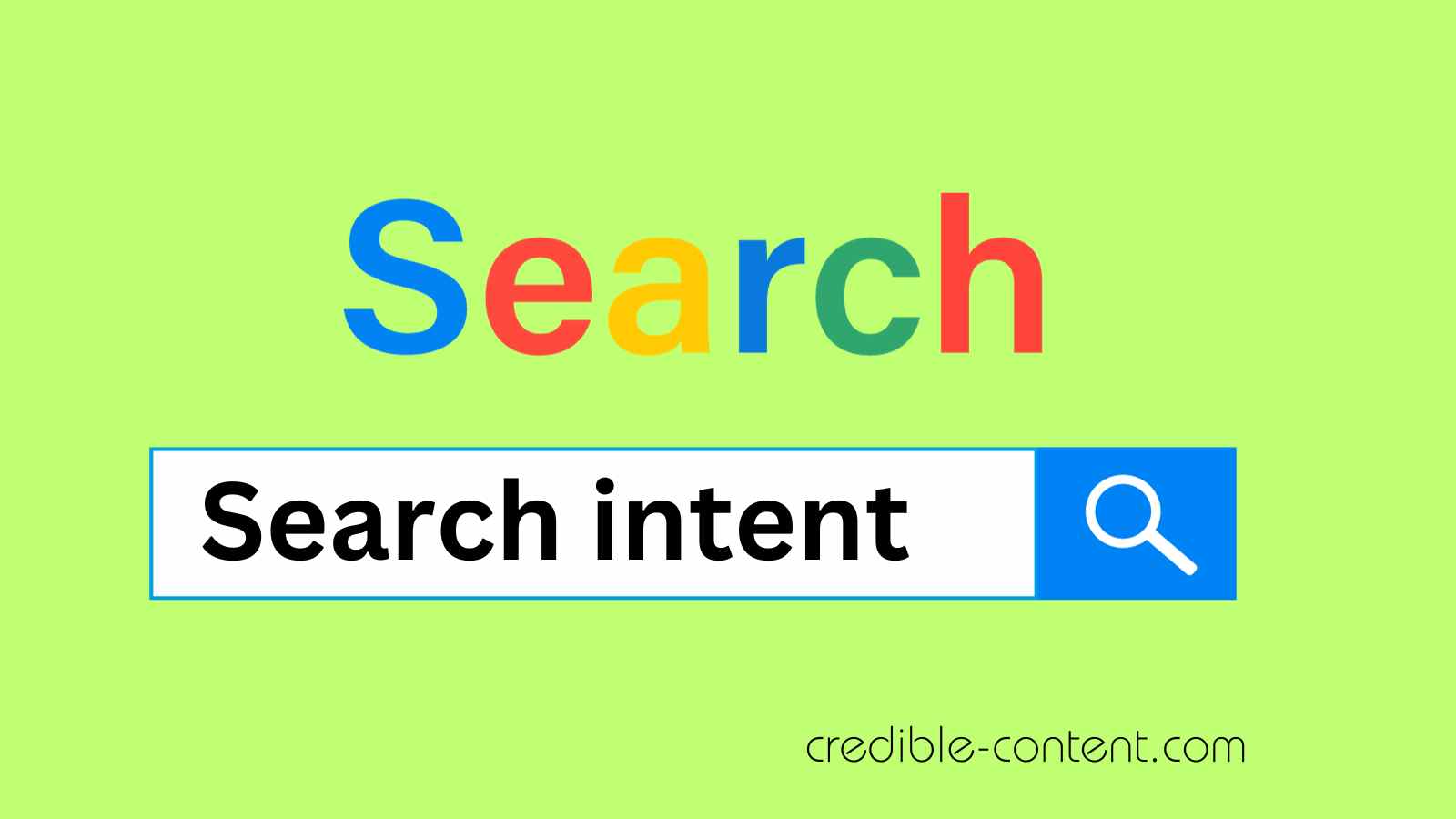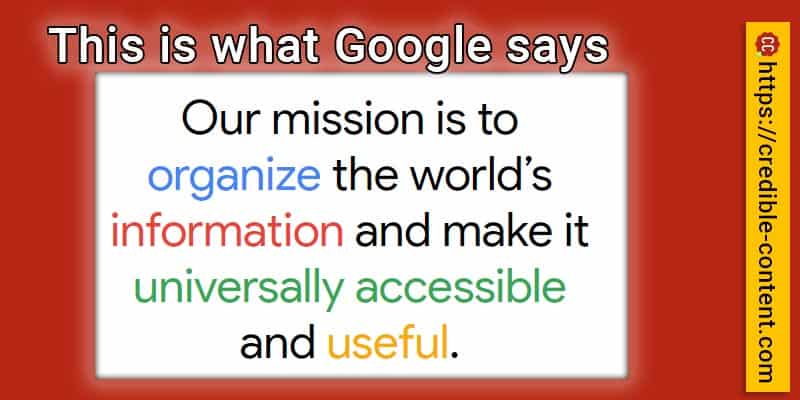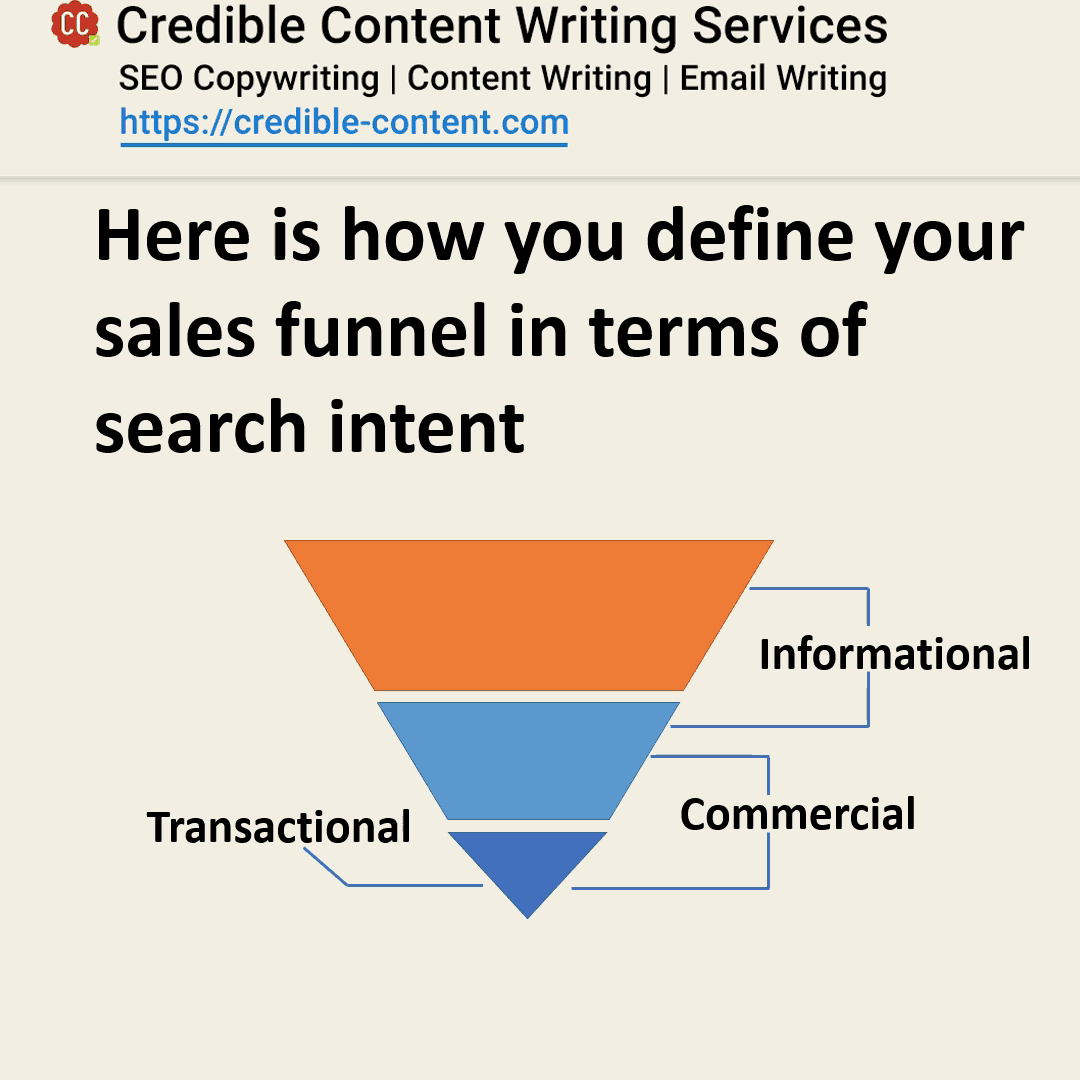When you are writing content, it is very important that you know the search intent of your reader persona.
Table of contents:
- The importance of targeting informational search intent when writing content
- Wondering how search intent improves SEO?
- How does writing content for search intent improve your SEO?
- 35 reasons why knowing the correct search intent improves your rankings
- The slight difference between commercial and transactional intent and how to target them through content writing
- Converting different search intents into a solid sales funnel through strategic content writing
- How does targeting search intent improve your SEO?
Targeting a search intent when writing content helps you improve your SEO.
In fact, I have created a small video to use in various blog posts and presentations when I quickly need to explain what is search intent. Here it is
In plain language, search intent means the intention with which a search engine user searches something.
Want to know how search intent improves SEO?
You can use search intent to improve SEO. These are direct connection between SEO and search intent.
Various SEO and digital marketing experts suggest that there are broadly for types of search intents:
- Informational search intent.
- Navigational search intent
- Commercial search intent.
- Transactional search intent
You can take your own example. When you search for something, what is your intention?
You are simply looking for information? Do you seek opinion from the others before you buy something? Are you ready to buy something?
For example, you want to improve your search engine rankings and you feel, reading a book might help.
You may search for “the best book on SEO” or “the best search engine optimization book”.
How search intent improves SEO.
If, instead of a book, you simply want to read some good material on SEO that you can implement on your website, you may search for “a detailed SEO guide”.
If you want to know how content writing can help you improve your rankings, you may search for “how does content writing improve SEO?”.
Sometimes you are seeking information just for the sake of seeking information.
Sometimes you want to buy something but before that you need some sort of re-affirmation.
These are different searcher intents.
You won’t look for “SEO copywriting tips” just because you want to kill some time. You need that information to achieve something.
If you want people to be able to find your website for the right search intent, you need to streamline your content accordingly.
Do you only target for the commercial or the transactional search intent?
After all, you want to increase your sales.
As a professional content writer and an SEO copywriter, I want the maximum number of people submitting my contact form to hire me as their writer.
It’s not easy.
There are hundreds of content writing services there.
They are already ranking quite well for all my primary and secondary keywords (this may also be applicable to your business).
In such a case scenario, it is important that you strategically target a number of search intents and not just the transactional search intent, though, this is the ultimate goal.
The importance of targeting informational search intent when writing content
Since it is easier to give my own example, I’m going to give my own example.
Unless you know that you need quality content writing services to improve your conversion rate, how are you going to decide to hire my services?
You need that particular level of awareness, to an extent that you are ready to spend money on my services.
Hence, as a service provider whose business depends on your level of awareness, I need to educate you.
Even if you have a basic idea of how my content writing services can help improve your conversion rate and bring down your bounce rate, you need a little bit of convincing through more information.
Also, if I need to convince you that SEO copywriting actually improves your search engine rankings, I must provide you hard facts.
I must explain to you why Google appreciates fresh content.
I must also explain to you how Google and other search engines evaluate your keywords when ranking your content.
This is one thing.
The second thing is, search engine terms like “content writing services”, “SEO copywriting services”, “blog writing services”, “freelance content writer”, and such, have already been optimized for, by other companies.
Competing with them is going to take a lot of time for me.
So, what do I do?
I publish lots of informational content to improve my rankings for longtail keywords.
It is easier to improve your search engine rankings for longtail keywords because they are less competitive.
Longtail keywords targeting informational search intent may not get me direct business, but it prepares the ground for my ultimate goal.
Since I’m regularly publishing valuable content that is full of useful information, other bloggers and online publishers often link to my content, giving a boost to my search engine rankings.
People share my content on social media channels, bringing in more visibility.
Since there is no dearth of information topics under content writing and SEO copywriting, I can publish practically unlimited number of webpages and blog posts without the risk of publishing duplicate content.
When I regularly publish content, Google crawls my website with greater frequency.
The benefit is that when I add new content it quickly gets indexed by Google. Sometimes, even within 10-15 minutes.
What sort of informational search intent you should target for when writing content or when aiming for SEO?
Suppose you are an accounting firm. You can cover lots of topics for which your prospective customers may not contact you for your services, but they can use your advice to solve many day-to-day problems.
Similarly, if you are a web developer wanting to attract startups and small businesses, you can write lots of informational content on the benefits of working with an independent web developer.
You can talk about the technologies that an average web developer uses to provide affordable and efficient web design services to startups and small businesses.
This way, you increase your visibility and this increased visibility prepares the ground for more business queries.
Informational intent topics begin with “why”, “how”, “when”, “where”, “how many”, “what”, “the top 10”, and so on.
An example: “when are the next Olympics going to be held after Covid?”
Another example: “what are the benefits of working with a content writer?”
Wondering how search intent improves SEO?
Imagine you’re lost in a giant library. You need a specific book, but there are millions of them! How do you find it quickly? By knowing what you’re looking for, right?
That’s exactly how search engines work. They want to show you the best results for what you’re actually looking for, not just any random page. This is where search intent comes in. It’s like a whisper telling the search engine what’s in your mind.
Search intent: It’s the reason behind someone’s search query. Are they curious? Wanting to buy something? Looking for instructions? Understanding this intent helps Google and other search engines show the most relevant results.
How does this improve SEO (Search Engine Optimization)?
Think of SEO as making your website the easiest book to find in the library. The better you understand search intent, the better you can optimize your website to show up for the right searches.
Here are five ways:
1. Keywords with Purpose:
Imagine searching for “pizza near me.” You’re not just looking for any pizza recipe, right? You want one you can order or visit now!
So, use keywords that show intent. Instead of just “pizza,” try “best pizza delivery Ghaziabad” or “pizza restaurants open late Ghaziabad.”
This tells Google exactly what you’re looking for and helps your website rank higher for those specific searches.
2. Content that Clicks:
Once someone clicks on your website, you want to keep them there. If they searched for “how to make slime,” don’t just show them a picture of slime! Give them a step-by-step guide with pictures and tips.
Create content that matches the searcher’s intent. Informative for informational searches, persuasive for buying searches, and entertaining for, well, entertaining searches!
3. Titles that Tell:
Think of your website’s title as a book’s spine label. It should tell you exactly what’s inside.
Don’t just use generic titles like “My Website.” Be specific! “Fun Slime Recipes for Kids” or “Order Delicious Pizzas Online in Ghaziabad” are much more likely to grab attention.
4. User-Friendly Design:
If the library shelves are all jumbled up, you’ll give up searching, right? Make your website easy to navigate.
Organize your content clearly, use headings and subheadings, and have a simple search bar. This helps users find what they’re looking for quickly, keeping them happy and coming back for more.
5. Local is Lovely:
Remember searching for “pizza near me”? Many searches are now location-specific.
If you have a local business, use local keywords and optimize your website for Google My Business. This helps people in your area find you easily.
By understanding and using search intent, you’re basically giving search engines a map to your website.
It’s like having a helpful librarian guiding lost readers straight to your book. So, keep these tips in mind, optimize your website with intent, and watch your online traffic soar!
Remember:
- Focus on the user’s needs. What are they looking for?
- Use relevant keywords and titles.
- Create helpful and engaging content.
- Make your website easy to navigate.
- Target local searches if relevant.
With a little SEO magic and a focus on search intent, your website will be the most sought-after book on the digital bookshelf!
How does writing content for search intent improve your SEO?
- Make sure your content matches what users need. Understand what people are looking for to create content that’s useful to them.
- Keep users interested and avoid them leaving quickly. Content that matches what people are looking for can make them stay on your website.
- Create content that speaks to your audience. If your content answers their questions or talks about what they care about, they’ll like it more and might buy from you. How search intent improves SEO.
- Make people click on your content in search results. Write titles and descriptions that make them want to visit your page.
- Get more people to visit your website by giving them helpful information. When your content matches what people are searching for, they’re more likely to find your site.
- Use long-tail keywords well. These are specific words that match what people are searching for, bringing more visitors to your content.
- Improve your chances of showing up in search results for the right queries. If your content matches what people are looking for, search engines will rank it higher. Search intent to improve SEO.
- Make your website easier to use. Good content that matches what people want improves the website’s overall experience.
- Avoid having similar or low-quality content. If your content is good for search intent, you won’t have problems with duplicated or weak content on your site.
- Get better backlinks from trusted websites. Good content that matches what people need can attract links from respected sites, helping your SEO.
- Make your website more trustworthy and important. When you have content that fits user intent, it builds your website’s reputation in your field.
- Gain trust and respect from your audience. If your content always meets search intent, people will trust your brand more and become loyal customers. SEO and search intent.
- Optimize your content to show up in featured snippets. If your content matches what people want to know, it might appear as a featured snippet in search results.
- Have a better chance of showing up in “People Also Ask” sections. Content that fits user intent might also appear in these sections, giving you more visibility.
- Get a bigger share of the conversation in your industry. By addressing different aspects of search intent, you can become a more influential voice.
- Adjust your content for different stages of the buying process. Understand what people want at different times to create the right content.
- Bring more potential customers to your site. Content that matches what people are looking for can attract those ready to buy. How search intent improves SEO.
- Make your content work for voice search and virtual assistants. Optimize for search intent to reach users asking questions using voice commands.
- Outdo your competition by understanding what people want. If others don’t focus on search intent, you can get more traffic and customers.
- Answer specific questions in your content. Create content that directly responds to what people are asking. SEO and search intent.
- Solve real problems your audience faces. Make sure your content helps people with their actual issues and concerns.
- Pay attention to what search signals tell you. Analyze keywords and user behavior to make sure your content matches what users are searching for. Search intent to improve SEO.
- Make your content easy to read and skim. Well-structured content that’s easy to scan keeps visitors interested.
- Use pictures, graphics, and videos that fit your content. Visual elements can make your content more interesting and help users understand better.
- Add structured data for better search results. Using structured data can help search engines understand your content and show more information in search results.
- Keep your content current and relevant. Update your content to keep it fresh and valuable, which is good for SEO.
- Listen to feedback from users and adjust your content strategy. Pay attention to comments and data to improve your content based on what people want. Search intent to improve SEO.
- Improve your local SEO with content that matches local search intent. If you have a local business, create content that’s relevant to your local audience. Writing content for search intent.
- Get more social media shares and interactions. Content that aligns with user intent is more likely to be shared on social media, which can help your SEO indirectly.
- Include clear and persuasive calls to action (CTAs). Make it obvious what you want users to do next after reading your content.
- Build a loyal following that comes back for more. Consistently delivering content that fits search intent can help you build a loyal audience.
- Increase the number of visitors who become customers. Content that aligns with search intent can lead to more conversions because it attracts users who are ready to take action. Search intent to improve SEO.
- Make sure users have a great experience and leave happy. Matching search intent ensures a good experience, which keeps people satisfied and coming back.
- Make your content work well on mobile devices. Optimizing for mobile is important for reaching users on smartphones and tablets.
- Create content that people want to share and link to. Content that meets search intent is more likely to be shared and linked to, which helps your SEO.
- Avoid competing with your own content for the same keywords. Focus on different search intents for your various pieces of content to prevent conflicts. How search intent improves SEO.
- Adapt to changes in search engine rules. As search engines get better at understanding what people want, your intent-based content will continue to perform well.
- Use data and analytics to improve your strategy. Regularly look at data and SEO numbers to fine-tune your content strategy and adjust to changing search intent.
- Get more leads using content that attracts potential customers. Intent-based content can be used to create valuable lead magnets, like eBooks or webinars, to capture leads and build your email list.
- Create a strong, lasting SEO strategy. By consistently producing content that fits search intent, you can establish a solid foundation for long-term SEO success, even when algorithms change.
35 reasons why knowing the correct search intent improves your rankings
- It is crucial to understand search intent because this understanding can significantly contribute to improving your website’s rankings in search engine results.
- When you correctly identify the search intent behind user queries, you can align your content with what users are actively seeking when they use search engines.
- This alignment enhances the overall relevance of your content, making it more likely to meet and exceed user expectations.
- Consequently, when your content is relevant and aligns with search intent, users are more inclined to engage with it by reading, clicking, and exploring your website further. How search intent improves SEO.
- Engaged users tend to spend more time on your site, sending positive signals to search engines about the quality and relevance of your content.
- These positive signals, including a longer average time spent on your site, can contribute significantly to improved search engine rankings.
- Moreover, quality content that effectively matches search intent tends to attract more backlinks from other websites in your niche or industry.
- The presence of backlinks further enhances your website’s authority, which is a critical factor in determining search engine rankings. SEO and search intent.
- Higher authority is often associated with better search engine rankings, providing your website with a competitive edge.
- Correctly identifying search intent can guide your keyword selection, ensuring that you target the right keywords that closely align with user queries.
- By targeting the right keywords, you increase the visibility of your content in search engine results pages (SERPs).
- Improved visibility means more users will discover and click on your content, resulting in increased organic traffic.
- Creating content that accurately matches search intent also plays a crucial role in keeping your bounce rates low.
- Low bounce rates indicate that visitors find your content relevant and engaging, which is a positive signal to search engines.
- Satisfied users who find what they are looking for on your site are more likely to take desired actions, such as making a purchase or filling out a contact form. Search intent to improve SEO.
- These conversions not only contribute to your website’s success but also impact your return on investment (ROI).
- Furthermore, understanding search intent allows you to craft compelling and relevant titles for your content.
- Engaging titles can significantly increase the click-through rates (CTR) of your content when it appears in SERPs. How search intent improves SEO.
- Higher CTRs result in more organic click-throughs, which, in turn, drive more traffic to your website.
- An increase in organic clicks can have a positive impact on your search engine rankings.
- Knowing search intent also aids in structuring your content effectively, making it more accessible to your audience.
- Properly structured content is not only easier to read but also simpler to navigate, providing a better overall user experience.
- User-friendly content keeps visitors engaged, encouraging them to stay on your site longer.
- Increased engagement has the added benefit of reducing your site’s bounce rate, further indicating to search engines that your content is valuable. Search intent to improve SEO.
- A reduced bounce rate is a favorable signal to search engines, and it can contribute to improved rankings.
- Ultimately, satisfying search engines by providing content that closely aligns with search intent is a strategic way to work towards higher search engine rankings.
- Understanding search intent also supports the creation of persuasive and relevant meta descriptions for your content.
- Compelling meta descriptions can effectively entice users to click through to your site from SERPs. How search intent improves SEO.
- Clicks generated from search engine results pages enhance your overall CTR.
- High CTRs are strongly associated with improved search engine rankings.
- Correctly identifying user goals through search intent analysis helps you refine your content topics, ensuring they resonate with your target audience.
- Choosing relevant topics based on search intent can generate more search traffic to your site, increasing your overall online visibility.
- Increased traffic to your site is a strong signal to search engines about the value and relevance of your content. Search intent content writing to improve SEO.
- Valuable content is more likely to attract natural backlinks from other authoritative websites within your niche or industry.
- The combination of backlinks and valuable content can further boost your search engine rankings, making it a key strategy in your SEO efforts.
The slight difference between commercial and transactional intent and how to target them through content writing
There is a small difference between commercial and transactional intent.
These two terms are confusing, but it is important to understand the difference and then write your content accordingly.
Commercial intent: You are ready to purchase but you need to compare various items before you finally decide.
Some examples of commercial intent:
- Best content writing service.
- Best SEO copywriting service.
- The review of SEO copywriting services/content writing services reviewed.
- Best cook food for junk food.
- Google Pixel an iPhone comparison.
As you can make out, the person is ready to take the plunge, but she wants to make the best choice.
Transactional intent: You are ready to purchase and you just want to go to the right place to purchase.
Some examples of transactional intent:
- Nearest food delivery service.
- Hire a content writer service.
- Buy red Gucci bag.
- Coupons for Grammarly.
The person is ready to buy. She just needs to know where to buy it.
Converting different search intents into a solid sales funnel through strategic content writing
You first create informational content to raise awareness about your product or service.
You give enough information to your visitors and convince them further.
You help them buy from you.
In terms of search intent, here is how you define your sales funnel:
I created another explainer video for LinkedIn and Twitter and I have simply extracted a screenshot to graphically explain the concept.
Publish lots of informational content.
This increases familiarity with your brand.
Publish commercial content.
This convinces your prospective customers and clients that you have got what they are looking for.
Explain to them how they can do business with you.
How does targeting search intent improve your SEO?
SEO is all about right targeting.
You don’t want to generate random traffic to your website or blog.
You want to generate traffic that solves a purpose.
Whether you want to inform people, educate them about your business, ask them to buy from you, the intent of your content must be clear.
Only then you improve your SEO.
Looking for content writing and SEO copywriting services to target the right search intent?
Contact me for more information.







